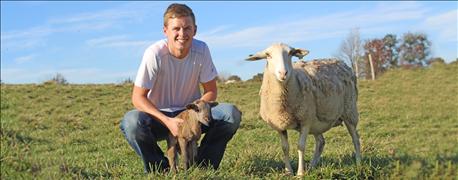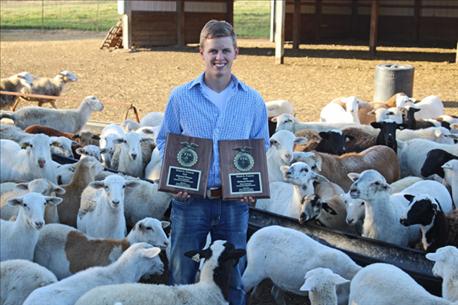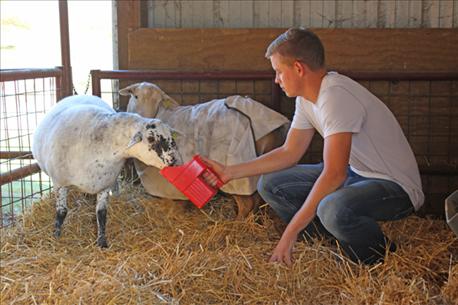
He appears just over the ridge in the pasture, with a lamb in hand. Trotting along at his heels is the newborn lamb's mother. It is November, and this is just what Brant Francis has been working toward — fall lambing.
"We want them to lamb three times in two years," he says. "It really helps when they fall-lamb."
Francis is the 2016 National FFA Sheep Proficiency Award winner. His family has been raising sheep near Paris, Mo., since before the 20-year-old was even born. "As I understand it," he says, "during my first lambing season, I spent a considerable amount of time in the playpen."

NEW BEGINNING: National FFA Sheep Proficiency Award winner Brant Francis spends time away from college in the sheep pastures at his home in Monroe County. Francis manages the flock for fall lambing, which puts lambs on the ground in October.
Carrying on tradition
Francis started raising his own sheep as a 4-H project at the family farm in Monroe County. He purchased two Southdown ewe lambs, which are considered a wool breed but are also used for meat. Francis took time learning about the sheep industry. He participated in docking tails and giving vaccinations. He even did his fair share of bottle-feeding orphan lambs.
What started as a family tradition soon developed into his own ag business. Through his FFA Supervised Agricultural Experience program (SAE), Francis grew his Southdown flock to 21 ewes and one ram.
Being involved in the purebred sheep industry allows him to travel to county, state and national shows, exhibiting his animals. By selecting and breeding high-quality genetics, he was able to garner top honors at the Missouri State Fair breeding sheep show, winning reserve champion ram in 2014.
Francis retains some animals for his own flock, while selling other Southdown offspring to fellow exhibitors. Still, he saw room for improvement in his sheep program.

RAISING THE BAR: Brant Francis brought the very first National FFA Proficiency Award winner to the Paris FFA Chapter. He was recognized at the convention in October for his work in sheep production.
Time for change
Francis Family Farms had already been transitioning their sheep flock away from the wool breed and into a hair breed. "There is less maintenance with the hair breed," Francis explains. "They are less susceptible to parasites and disease, and they offer our operation out-of-season breeding characteristics." He could see the benefits to the hair breed and added 10 registered Katahdin ewes to his sheep SAE.
For Francis, it boils down to an ag business decision. "I am managing my Katahdin ewes to produce three lamb crops over a two-year cycle," he says. "If I can get 1½ lambs out of a Katahdin ewe, that is $125 more in my pocket."
The breeding program is one where ewes are exposed to a ram in September and October, and then to lamb in early winter. Then they are rebred to lamb the following April and May. So far the system is working; Francis has 80% of his ewe flock producing an average of 5.1 lambs per ewe exposed in a two-year period.
He markets his sheep at local sale barns and directly to consumers.

INVESTING TIME: Making time to interact with his Katahdin sheep is important to Brant Francis. It helps him assess their health and body condition, and be able to make adjustments to ensure the success of the operation.
"The change has helped my profits," Francis says. "We produce a high-quality, grain-fed lamb product that consumers want."
4 things I learned from my SAE
When Brant Francis looks back on his years raising sheep in the FFA Supervised Agricultural Experience program, he finds it has taught him four main things.
1. The value of hard work. His SAE is work. Tending to animals is difficult work. There is the physical labor of filling feed buckets, bucking straw bales and catching the animals for vaccinations. It is washing, shearing and training sheep before livestock shows. It is the loading and unloading on market day. But after every chore, Francis takes pride in his accomplishments: in raising a product he and his family can be proud of and ultimately, consumers can enjoy.
2. Dedication to a cause. Francis' cause? Raising high-quality sheep for consumers. It is doing the hard work when it is not easy. Taking on chores while trudging through snow and skating on ice, when it is raining or sweltering hot. Staying the course when the markets are high and more importantly, when they are low. Francis finds that remaining focused on the task at hand keeps him dedicated to his business.
3. Time management. Most FFA members are not just working on the farm. Francis was a high school student. He played basketball, baseball and golf. He was involved in National Honor Society and church groups. He also kept up with his studies, farm chores and work off the farm. Today, he attends the University of Missouri, Columbia as a plant science major with an emphasis in turfgrass management. He says his FFA SAE taught him how to balance his time and schedule. It is something he is putting to practice in college.
4. That mentors matter. Francis finds that he could not have had such a successful SAE if it had not been for his mentors. From his parents, Tony and Barb, to his brother Britton and sister Aly, he realizes it takes a family to make a farm work. Then there are his FFA advisors over the years: Josh Bondy, Teresa Briscoe, Jessy Reuterdahl and Stephanie Eckler. Without solid guidance in the FFA, he would never have made it onstage at the National FFA Convention and Expo in Indiana.
About the Author(s)
You May Also Like






